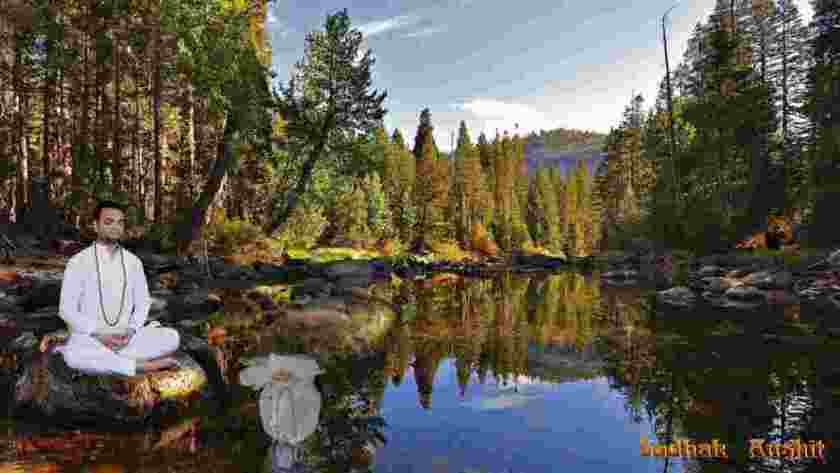ACTIONS IN LIFE-KARMA
Movement is life; Ups and downs in life are inevitable. All living beings are action bound. How to lead our daily life?
Prescribed actions for daily life- Artha, Dharma, Kama and Moksha
“Dharma (Duty)” Yoga Shastra gives importance to Dharma (Duty). The first Sloka in the Mahabharata has Vyasa shouting at the top of his lungs that everyone should do their duty. If you do your duty, everything else will follow – name, fame, money, etc. Others will keep telling what to do, but we must concentrate on what we have to do. Yoga tells us to look within. So it begins with Duty. Firstly keep yourself in the correct state of mind. Take care of your body and mental balance. Do not get too excited or too sad. If there are problems, it is easy to get unhappy, but we have to use our intelligence and not get affected when problems come.
“Artha” means earning money to sustain ourselves. Be grateful for the money you have and spend only when necessary. Excess of anything is bad including money. Too much money brings with it own share of problems, we don’t know when to stop, greed inflames ego, other areas of life like health, family time etc. are compromised to earn more and more money. Where there is a pleasure, there is a pain, so do everything in the right proportion.
“Kama” means pleasure. One should definitely watch movies or dramas or listen to music, learn to dance. It is necessary for every person. Derive happiness from it. Share a joke or two every day. Husband and wife hardly talk to each other, instead of at least smile at each other and share happiness. We don’t know how long we are going to live.
“Moksha” is selfless actions and comes into the personality slowly. What separates us from the animals is our ability to think and act; compassion etc. Remember that we do not want to live like animals (just eat and sleep each day); we want to move towards the divine and help people in need as much we can. Put in the effort for self-development. Make sure we are improving and becoming better than what we were yesterday.
Bhagavad-Gītā describes different kinds of actions we perform in our day-to-day life. Most of the actions are of three types – Karma, Akarma and Vikarma.
- Actions that are done in terms as per the prescribed duties are called “Karma.”
- Actions that will free an individual from the continuous cycle of birth and death are called “Akarma.”
- An action performed by the misuse of one’s freedom directs an individual to the lower life forms are called “Vikarma.”
Of these three kinds of action, which frees one from the burden of karma is favoured by intelligent men. Whereas ordinary men wish to perform good work in order to be recognised and attain higher status in this materialistic world, but more progressive men want to be free altogether from all the actions and reactions of work
The four pathways prescribed of accomplishing moksha from the worldly pleasures are— Raj Yoga, Karma Yoga, Jnana Yoga and Bhakti Yoga.
- Karma Yoga or the yoga of altruistic actions tell that through the correct actions; the ego can be subdued. Excellence in work is karma yoga. When an individual is going on about doing his work with morality, devotion and dedication but in a non-attached manner is karma. Not worrying about the results or fruits of your labour is the best way to go on doing your daily work.
- Bhakti Yoga is the process of inner purification. Love is the vital element for all human beings, it teaches. Love is pure and cosmic, but ego pollutes it due to our negative personality traits like desire, greed, jealousy and rage. Higher consciousness truly loves us and takes care of everyone. Bhakti Yoga path involves praying, chanting holy mantras, studying sacred scriptures and keeping the noble company close to your heart.
- Raja Yoga strives to accomplish the divine by kindling the flame of knowledge of the self from within. Most seekers lack the required patience and perseverance to follow this path. Raja Yoga involves attainment of total concentration by way of meditation. All the fluctuations and inherent Kleshas are quieted and dispelled through rigorous meditation.
- Jnana Yoga is the conduit of knowledge. Avidya or the darkness of ignorance is overcome through the light of knowledge. Knowledge of ‘fire’ and ‘light’ helps to burn all the impurities of the mind. The mind through correct knowledge gives up its attachment to worldly pleasures and understands the difference between permanence and impermanence. Self-knowledge by exercising Jnana Yoga is the path to true liberation.
All paths lead to the same higher reality. But every individual is different hence different ways are prescribed. So explore all the paths and pick the path that works best for you.
